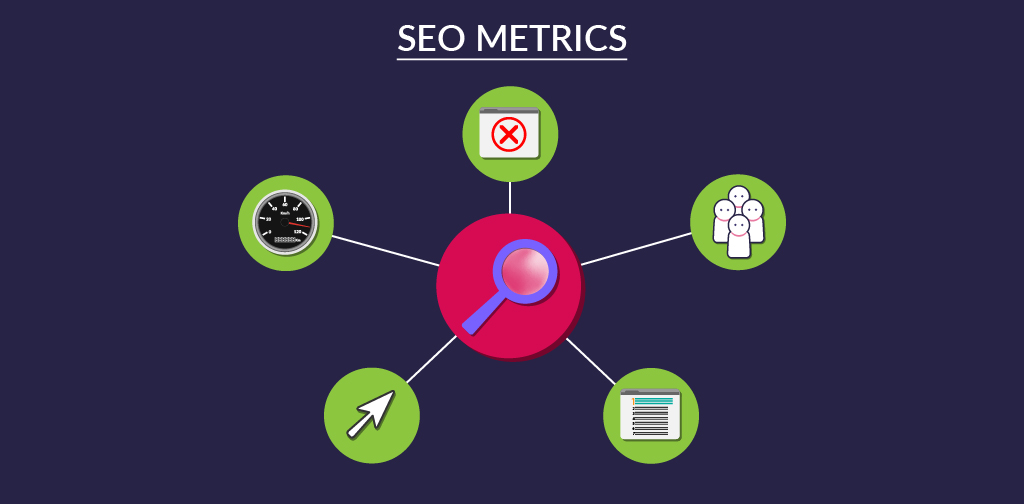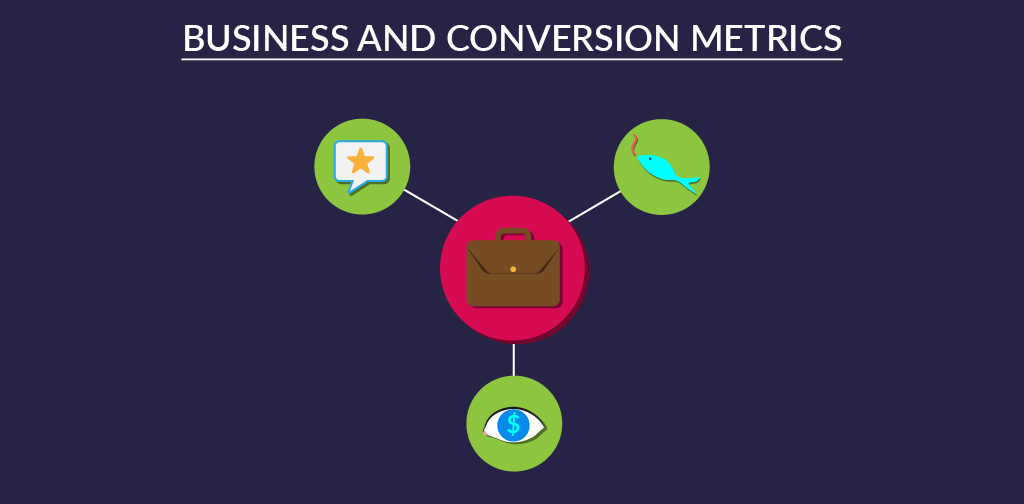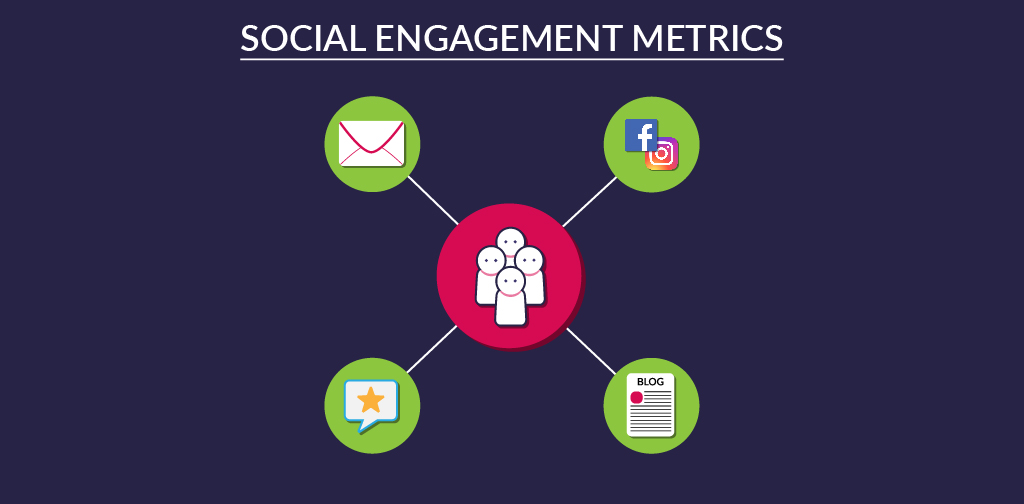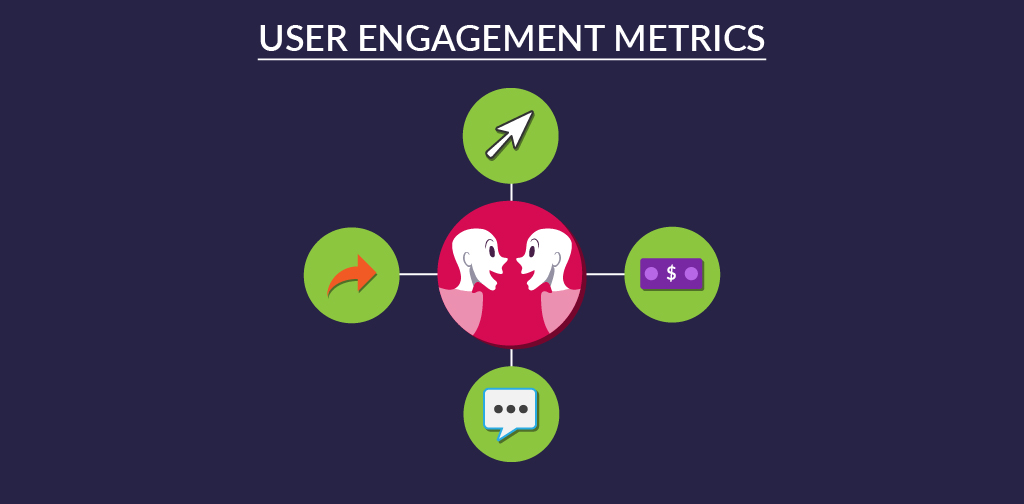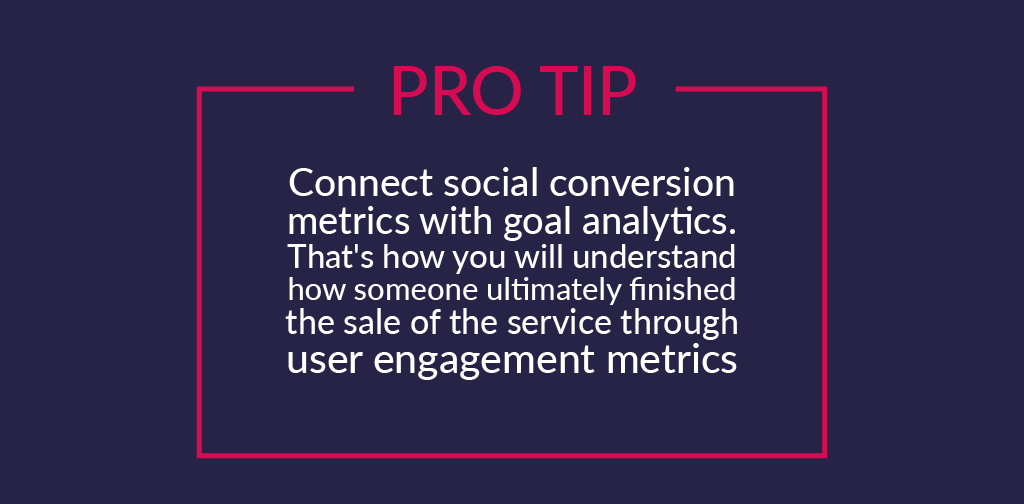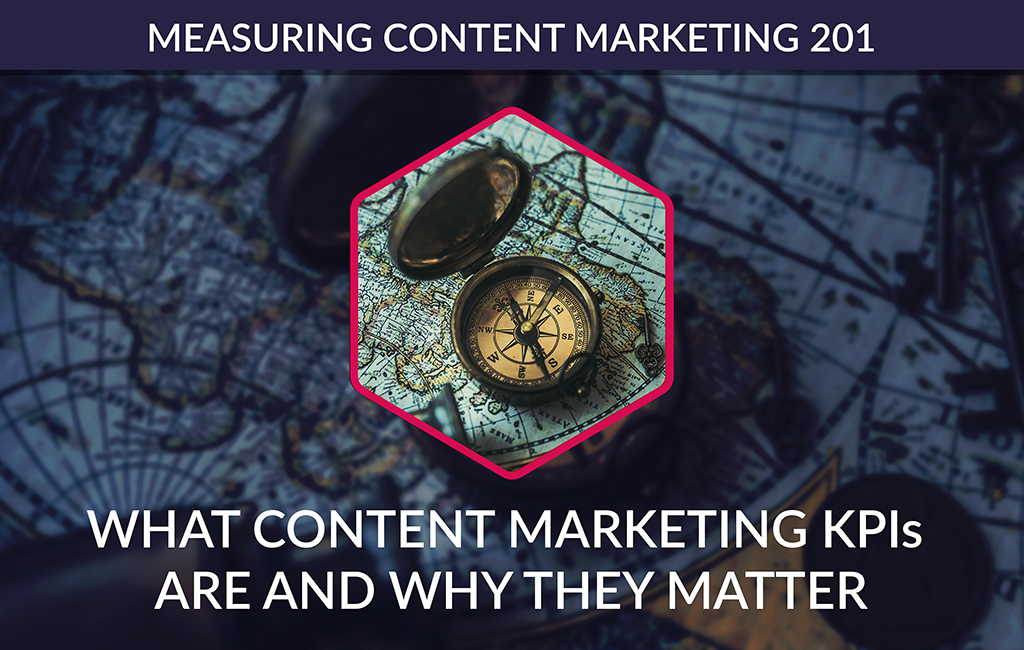
Table of content:
The article contains:
Developing a strategy is just the first step in the complex and exciting field of content marketing. It’s essential that you establish your content marketing key performance indicators (KPIs) right from the start – as well as how you will measure and report on them.
KPIs are critical if you’re looking to get buy-in for your content marketing strategy or secure continued support from executives. Consider the matter from the perspective of your manager for a moment. Why invest in the form of marketing that doesn’t bring any measurable benefits?
That’s why content marketers need to produce reports that show numbers. And the best way to do that is by choosing and tracking content marketing KPIs.
In the first part of our guide to measuring content marketing, we focus on:
- What content marketing KPIs are,
- Why they matter so much in every content marketing strategy,
- Which KPI groups you need to consider for your business.
Here’s why content marketing KPIs matter
When planning, creating and distributing content, you’re probably having a lot of fun. But it’s not just about you. After all, you aren’t producing content in a vacuum. You’re looking to engage people or even have them perform specific actions like buying your product or service.
You need to know how your content is performing online.
Sure, you can rely on the basics and turn on Google Analytics to check how many people visit your site and from which countries they hail. You can also have a look at your content and to see how many likes, shares or comments it gets.
But what you really need is more precise and detailed ways in which you can measure the performance of your content.
There are many content marketing KPIs that are easy to report on. You can also use them to identify and shape your overall content strategy. If you put together the right data, you will be able to reach correct conclusions from what the key performance indicators tell you.
With that knowledge, you can adjust your strategy to address the expectations of your audience better and create content they will consume just the way you want them to. What’s more important is that by measuring the right KPIs, you will identify the points that might make your content stand out from your competition. You need to back your conclusions with proper data, and that’s why KPIs are so crucial for reporting.
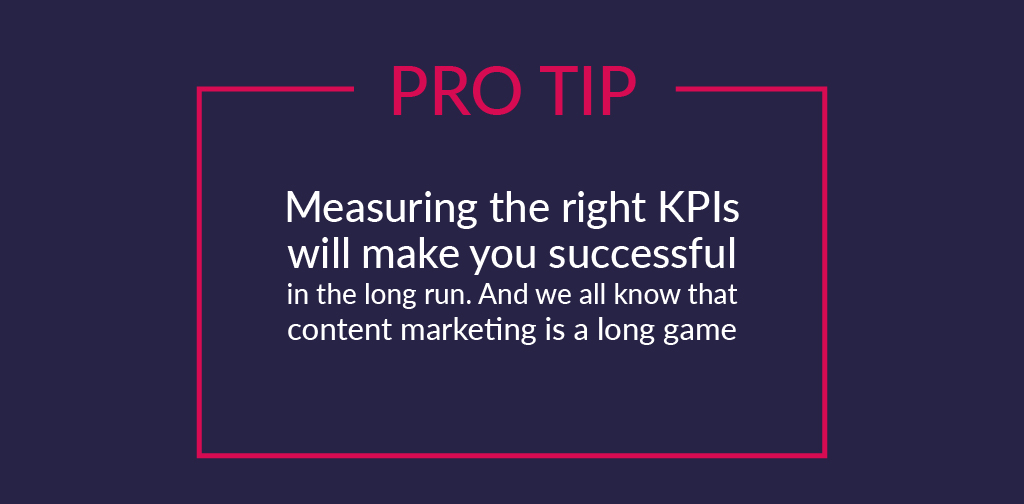
Without KPIs, you risk a lot
Key performance indicators can unlock the potential of your content marketing. But they can easily break down your efforts too. If you choose the wrong KPIs, you may commit errors in making decisions about your content strategy.
Companies that consider and communicate incorrect key performance indicators are making decisions on the basis of results that may not reflect the reality. Moreover, when you report on these results, your content strategy will suffer and might even prevent you from succeeding in your niche.
All of that makes key performance indicators extremely important to a successful content marketing strategy.
But what exactly are KPIs used for content marketing?
In general, we can distinguish between four different categories of key performance indicators that come in handy in content marketing: SEO metrics, business and conversion metrics, user engagements metrics, and social engagement metrics.
Here’s a breakdown of them all to help you understand how each contributes to painting the total picture of your content marketing effort.
Need help in distributing content? Check out our content marketing platform, we list thousands domains ready to publish your content.
1. SEO metrics
These are the metrics that are part of your SEO efforts. Search engine optimization takes advantage of different metrics to report about the increase of content performance in search results. And SEO KPIs are of value to content marketers because they can help us see how our site is performing.
They also indicate how much of the market share is gaining regarding particular keywords and keyword phrases in organic reach. SEO metrics also show the number of people viewing the site, how much time they spend on the site, and other useful things.
However, if these metrics are reported incorrectly, the results can be dire.
You don’t want to make strategic decisions on the basis of the wrong data, do you? It may have a negative impact on your content marketing strategy, but also your entire SEO implementation.
Also, don’t forget that to gain a better picture of how users behave on your site, you need to acquire months worth of data. Making decisions from data collected during a single month is not a good idea.
Here are some examples of the most essential SEO metrics you need to take into account in your reporting:
- Link rankings and SERP position
- Organic links
- Organic click-through rate (CTR)
- Number of impressions
- Page speed
- Crawl errors
2. Business and conversion metrics
Let’s not forget that content marketing and SEO efforts are all about addressing the business needs of your company. They are supposed to support your business activity by boosting brand awareness, directing consumers through the sales funnel, and generating leads.
That’s why you need a detailed report about these efforts. That way you will be able to communicate the ROI on these activities, so people in charge will know that you’re doing a great job and that content marketing had critical value to your organization.
Metrics like that will help you calculate the business value of content marketing and ensure that your website metrics translate into the most critical business metric: ROI.
ROI
But how do you calculate ROI in content marketing?
Let’s imagine that you would like to tailor your content marketing efforts toward keyword phrases with a particular strategy. For example, you can use keyword phrases and make sure they perform in search volume. That’s why you need to use these exact keyword phrases on the page that you’re optimizing. A few months pass, and you’ll be able to tell whether your content marketing strategy works.
You need to translate the keywords into conversions and calculate the final ROI results using the formula: which ROI = net profit / total investment * 100.
It’s critical that you always track the performance of your keyword phrases in one way or another. In our example, we used search volume, but many other metrics indicate positive increases in performance.
Conversion rates
Another key business value is conversion rates. Conversion rates are the metrics that will tell you whether your content is really working. If your content has low conversion rates, it means that it’s not convincing people to follow your Calls-to-Action, be it signing up for your newsletter, or purchasing your product or service. If you’re suffering from low conversion rates, there are many strategies you can use to find out what’s working and what isn’t. AB testing is an excellent method to determine the direction for your content.
Reviews
Finally, it’s also smart to keep tabs on reviews. That’s right; reviews are an important business KPIs as well. What other customers think about you is critical to your survival. It’s through reviews that your business is represented to your clients.
Reviews are a reputation management tactic so make sure to encourage customers to leave reviews and instantly responds to reviews that aren’t positive. Both will give you a helpful hand in lead generation.
3. Social engagement metrics
Your first thought might be that these metrics are just about social media like Instagram, Facebook, Twitter, or LinkedIn. Now, it’s true that when thinking about social engagement metrics we need to consider what’s happening on social networks.
But social engagement metrics are critical to your content marketing strategy because they are the ones that increase your reach towards real consumers online.
After all, social media is where real people hang out get, engage with their favorite brands, chat, and connect. Social media are nothing else than a form of conversational social outreach. You need to keep an eye on the right social engagement metrics to make sure that your reports are efficient in communicating your content KPIs.
Here’s an example:
Let’s imagine that you want to report on the most popular type of content consumed by your target audience. For instance, you may have a very long blog post that explains how to do something or achieve a goal. It was shared 2000 times on Facebook, 3000 times on Twitter, and 1000 times on LinkedIn. These results suggest that your target likes long-form content that delves into the topic substantially. When it reaches the right people, you can be sure that they will pass it along to their networks because it represents a tangible value to them. When considering your next blog posts, you can keep that insight in mind and tailor your content to your audience better.
But don’t forget to consider contributing metrics as well.
Just because a blog post explaining how to decorate a Christmas tree was extremely popular in December, it doesn’t mean it will achieve the same results in May. If you fail to take that information into account, you might end up believing that all your content should be about Christmas trees. That example is a little overblown, but the message is real. Actually, many content marketers make that mistake: once they see something working, they replicate the content and wish to achieve similar results. And when the results never come, they’re disappointed.
Now you see why KPI reporting data will help you make better and more informed decisions about your content strategy.
4. User engagement metrics
Conversion rates, bounce rate, time on page, and page views are all important metrics but remember that if you fail to report on them correctly, they may lead to serious errors in judgment about your next steps in your content strategy.
Here’s an example of what poorly reported metrics can do to your content strategy:
Let’s say that your blog post achieved amazing success and was shared by users on social media platforms over 4000 times. If you take a look at its conversion rate, you will see a high rate of over 50%. That means it’s quite likely that you obtained around 2000 sales of your product or service as a result. But if you dig a little deeper and check other user engagement metrics on your order placement side, you may find out that the fantastic sale was in reality only 10 sales where each person bought 200 instances of the service. Not a very impressive conversion rate after all, right?
If you forget about that additional dimension, you may see a high number of completed sales but never understand that behind them there’s just a dozen people. That’s why you need to keep track of all these parameters. User engagement metrics are key to understanding your site’s performance and KPIs will show you how effectively your content is gathering traffic and drawing people to your website.
Key takeaway
Key performance indicators are all essential to the success of your content marketing strategy. We hope that this article showed you why focusing on one metric over the other can bring catastrophic consequences to your business.
To gain the full picture of what is happening on your website and social network, you need to measure a broad range of KPIs that fall into these four categories.
Do you need more advice about measuring content marketing? Stay tuned for the next chapters of this series where we take a closer look at KPIs to help you develop measuring methods for your content marketing strategy.


